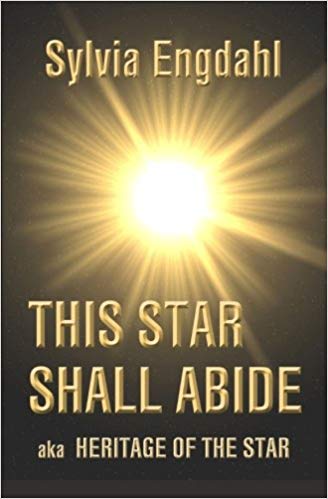THIS STAR SHALL ABIDE
By Sylvia Engdahl
252 pp. CreateSpace Independent Publishing. $9.95 (paperback) / $2.95 (Kindle)
Noren was a heretic. He defied the High Law and had no faith in the Prophecy’s fulfillment. But was defiance enough, or could some way be found to make it come true?
With a back cover blurb like this, you can probably see why we picked Sylvia Engdahl’s This Star Shall Abide as the Excitable Read for our issue on nonconformity. Who, after all, is more nonconformist than a heretic?
This Star Shall Abide the story of a gifted young man named Noren who rebels against the repressive society he lives in by openly declaring that he believes the Mother Star—the central symbol of their religion—is fake, made up by the Scholar caste to keep everyone else in line. The story follows what happens to this dangerously divergent thinker after he does so. It’s the first volume of the Children of the Star trilogy, and though it certainly has several dramatic external conflicts, Noren’s inner world is where the most important action happens.

In this respect, the novel offers a great example of the theory of positive disintegration (TPD) playing out. For starters, it’s chock-full of overexcitability (OE). Noren’s most obvious OE is intellectual—he is constantly analyzing his society and the motives of all the people in it—but he exhibits very strong emotional OE as well, and this proves crucial to his development in exactly the way Dabrowski would have predicted. Meanwhile, Noren’s betrothed, Talyra, is a great example of someone who is highly intelligent but apparently not intellectually overexcitable (since these are not the same thing). Talyra’s evident emotional OE, moreover, makes her both an upstanding citizen in the eyes of her community and highly compassionate to those the community considers less upstanding.
The story is also very likely to be of interest to anyone who relates to our notion of being a human catalyst. Such catalysts must engage with all different sorts of people, at all of TPD’s levels. The story will introduce you to people at all of TPD’s levels, with a focus on power and the various motivations of those who desire it (and those who don’t). Some characters, like Noren, are adjusted to what ought to be; others are very solidly grounded in what is.
There are a few things about this book that some people haven’t liked. For one, the society in which Noren and Talyra live is sexist, which some who read young adult fiction may find out of step with modern norms. Ms. Engdahl has said that this is just part of the repressive nature of this society. Personally, I found it valuable and thought-provoking to see how a woman born in the 1930s who has worked as both an elementary school teacher and as a programmer depicts a repressive society. Additionally, some people to whom I’ve recommended this book faulted the prose as stilted. They may have a point, but I’d also note that all of them liked the content enough to finish the book anyway. It’s not written to be a best-seller, but for the right audience, it’s a true gem. (This audience isn’t necessarily exactly the same as the traditional science fiction audience, so Third Factor readers who aren’t usually into SF might still love this one.)
Don’t be fooled by the fact that this book is independently published: Ms. Engdahl is re-releasing her own works in new editions, but they were originally released by traditional publishers, and the books earned acclaim. The School Library Journal in 1972 described This Star Shall Abide as “Superior future fiction concerning the fate of an idealistic misfit, Noren, who rebels against his highly repressive society…. Although there is little overt action, the attention of mature sci-fi readers will be held by the skillful writing and excellent plot and character development.” In 1973 it won the Christopher Award, given for “affirmation of the highest values of the human spirit.”
So if you liked any of the articles in this issue and are looking for something further on this theme, pick up a copy of this novel. If you’re a parent raising kids (age 12 and up) who constantly ask piercing questions about why the world is the way it is, whether scientifically or in terms of social justice, it will be a good read for them, too. I hope you’ll enjoy it as much as I did!
This Star Shall Abide is available as a stand-alone volume or bundled with the next two books in the Children of the Star trilogy (both of which were also enjoyable and thought-provoking), in paperback or in various e-reader formats:
- Your local library might have a paper copy of This Star Shall Abide or the Children of the Star omnibus edition.
- Better World Books has used copies of the whole trilogy, under Engdahl’s earlier Ad Stellae imprint, for under $4.
- Amazon has paper and digital versions of the single book and the trilogy. If you use this link, a portion of the money you spend will go to support Third Factor.
- Ms. Engdahl also has collected all sorts of other ways to get her book at her website.
Interested in discussing this piece? Join the conversation in our discussion forum.




